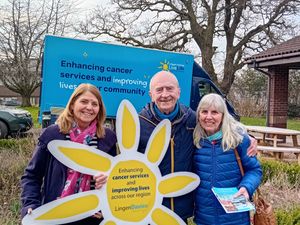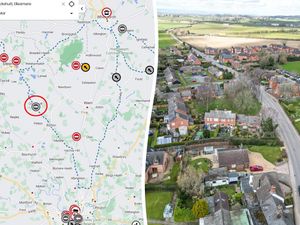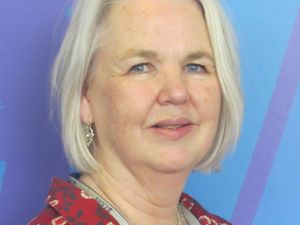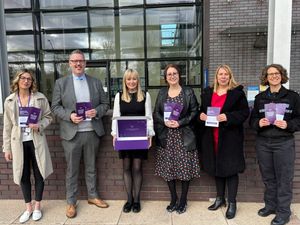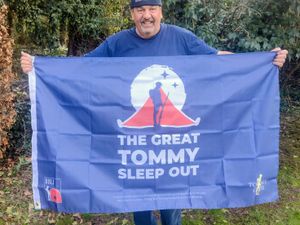New era dawns for Severn Hospice as boss Paul retires
Paul Cronin had only just taken up his post at Severn Hospice when he noticed a birthday cake that was being delivered for one of the patients.

"I asked whose birthday it was, and it turned out it was for the anniversary of having been admitted, it was for somebody had been admitted 12 months earlier," he says.
Paul, who retires next month after 15 years as chief executive, has seen a lot of change during his time at the helm. But for him, one of the most important things is the charity's Hospice at Home scheme, which means patients no longer spend 12 months or more on the wards.
"When I joined in 2003, we didn't have a Hospice at Home service, we just had this building," he says.
"Now people come in for short times before they are discharged and cared for in their own homes.
"Now we nurse more people in their own beds than we do in our wards. That is brilliant, because it is where people want to be."

The charity's Hospice at Home service now looks after four out of every five patients under the hospice's care, with a team of nurses visiting them in their own home providing round-the-clock support.
He is very proud of the way the hospice has been able to expand to meet the growing demand from the public.
Last year, 2,100 people were referred to the hospice, and the county has one of the highest rates in the country for providing hospice care at the end of people's lives.
Shropshire's only adult hospice
The latest figures from Public Health England show that about 10 per cent of adults in the Telford and Wrekin being cared for at the end of their life are hospice patients, while for the Shropshire Council area, the figure is 7.5 per cent.
This compares to a national average rate of just five per cent.
“We are the only adult hospice service in Shropshire and Telford and Wrekin so these figures underline how important and how successful our strategy has been in providing care to people in the community.
"When I first started, 450 new people were referred to us, last year 2,100 new people came to us."
Today the charity employs 300 full-time staff working both at the hospice and in the community, supported by 1,400 volunteers.
Paul who is 60, hands over the reigns to his deputy, Heather Palin, on July 4 at a time when the hospice is about to see another massive transformation. In August the hospice is due to begin the process of inviting tenders for a £5 million expansion at both its Shrewsbury and Telford sites, with the work expected to begin in the New Year.
Work at the Bicton Hill site in Shrewsbury is expected to begin first, where a new building will provide a drop-in service for people who are being cared for in their own homes, as well as acting as a base for the staff who care for patients in the community. A revamp which will create similar features at the hospice's Telford base at Apley Castle will follow shortly after.
"Hospices have, for a long-time been seen as places that would be cancer-centric and focused on end-of-life care," says Heather.
"That is still important, but these days people come to us with a variety of conditions, and many may have a much longer prognosis. They might have several years left to live, and they may appear initially to be in relatively good health.
"Living Well is a concept of care aimed at opening up our doors to patients with non-cancer conditions."
Living Well Centres
The new Living Well Centres at Shrewsbury and Telford will provide care and services for people with incurable illnesses who are able to live at home but come in for help and support when they need to.
"People still perceive hospices to be scary and sad places," says Heather. "The idea is people will come into an area that feels welcoming
“The proposed new centres would be used to support people living with any terminal and life-limiting illnesses to live as full a life as possible for as long as possible through the provision of clinics, therapies, palliative rehabilitation, and other daytime activities.”

Heather, a 56-year-old mother-of-three from Baschurch, has been with the hospice for nine years, having previously worked as a matron in the NHS.
"It's probably the first time I have replaced somebody and thought I do not need to change the world," she says.
"Because Paul and I have worked together very closely for nearly nine years, we have shared the vision for the organisation. In many ways it is a continuation of that work." Her role as nursing director will be taken over by Becky Richardson.

Of course, delivering that shared vision will cost money. The £5 million investment comes on top of the £7-million-a-year cost of delivering the existing services, and there is going to need to be a lot of fundraising over the coming months to generate the required resources.
Paul says the hard work and generosity of the people in the county never ceases to amaze him.
"It's amazing that we raise that money every year, but somehow it always happens," he says.
"There have been some years when it's been touch and go, but we always do it.
"We have got an excellent generation team, brilliantly supported by the public."
Paul, also a father-of-two who lives in Stanwardine, near Baschurch, says he plans to use his retirement to devote more time to voluntary work.
Remarkably, looking back on his 15 years at the helm, he says he cannot think of a single low point or moment of disappointment. But he says there have been plenty of highs.
"It means so much when a relative or somebody says you have made a difference," he says.
"The thing I am most proud of is the team here. Services and buildings are one thing, but the real heart of the hospice is the team."

